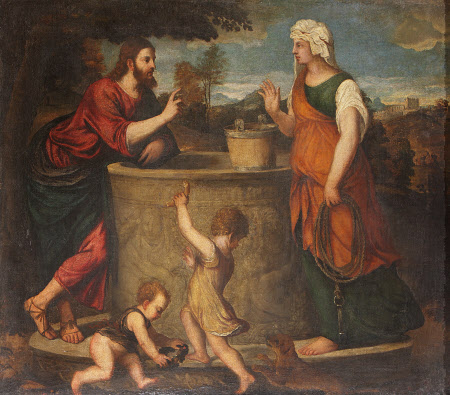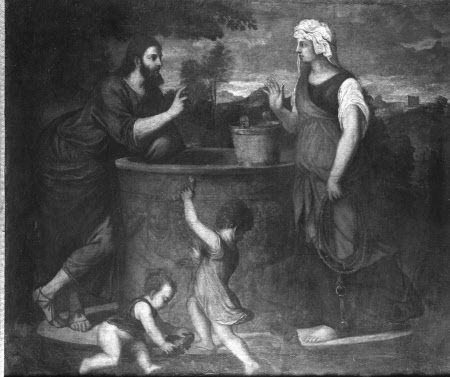Christ and the Woman of Samaria
after Bonifazio de' Pitati (Verona 1487 – Venice 1553)
Category
Art / Oil paintings
Date
1500 - 1599
Materials
Oil on canvas
Measurements
991 x 1156 mm (39 x 45 1/2 in)
Place of origin
Veneto
Order this imageCollection
Attingham Park, Shropshire
NT 609072
Caption
This biblical scene is taken from the Gospel according to John. The Samarian woman is shown drawing water at Jacob’s Well when she encounters Christ. The Woman, who had five husbands, and was living with another man, was ostracised by her own people. Moreover, Jews would not speak to the Samarian people. Spurned by all communities, the woman was singled out by Christ, as a demonstration of his love for and forgiveness of all humanity. The children playing in the foreground – a reminder of the woman’s marital status – are reminiscent to children or cherubs found in the work of Titian. The picture is close to that by Bonifazio at Hampton Court, but it is more likely to be after a lost original. It is an old copy, but not contemporary.
Summary
Oil painting on canvas, Christ and the Woman of Samaria, after Bonifazio de' Pitati (Verona 1487 – Venice 1553), 16th century. Full-length figures: Christ in profile to left, standing with his feet crossed, wearing a red robe and blue cloak, leaning on the rim of a tall wellhead, his right hand raised; in the foreground two children are playing in front of the well. To the right of the well stands a female figure in profile, wearing a yellow and blue dress, her hand raised with palm outstretched. Landscape setting.
Provenance
In 1847 inventory; included in the sale at Christie’s, 22 July 1938, lot 107 but bought in at 20 gns.; bequeathed to the National Trust in 1947 with the estate, house and contents of Attingham by Thomas Henry Noel-Hill, 8th Baron Berwick (1877-1947) on 15th May 1953.
Credit line
Attingham Park, The Berwick Collection (National Trust)
Marks and inscriptions
Verso: Christie’s stencil: 545 GS Verso: Chalk inscriptions Lord Berwick 46 x 39,107, July 22-38 (on reverse stamped) Verso: Inscribed on the stretcher, red wax seal of the REALE ACCADEMIA DELLE BELLE ARTI DI VENEZIA Verso: Inscribed on back of rough lining canvas: red stencilled MAB; red wax seal of a Baron Berwick (and stain of a lost one, near the initials) Verso: Inscribed on back of frame in pencil: C M delle [?] Magalos [?]
Makers and roles
after Bonifazio de' Pitati (Verona 1487 – Venice 1553), artist

